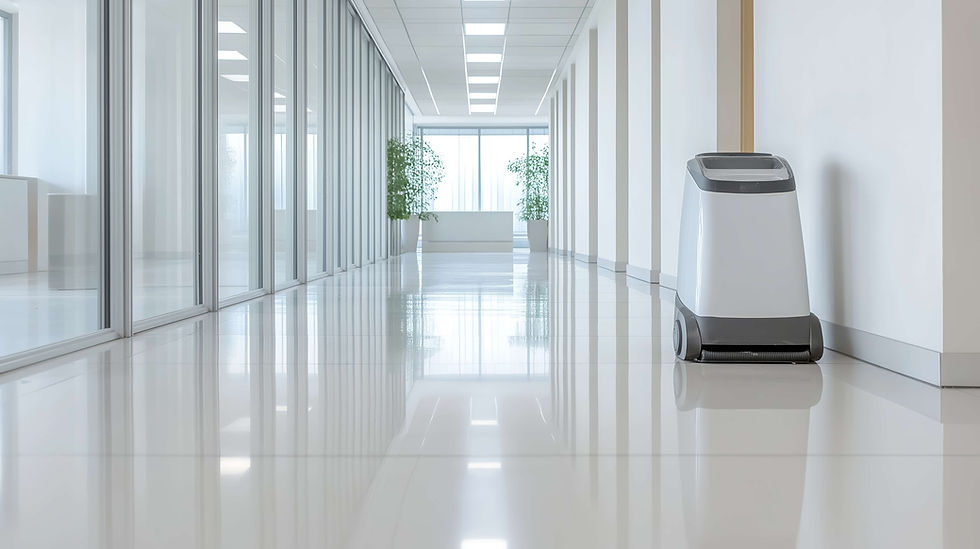Switching to Sustainable Cleaning Practices
- alex jankovic
- Sep 10, 2025
- 3 min read
In recent years, the shift towards sustainable living has gained significant momentum, particularly in commercial spaces. One important aspect of this movement is adopting eco-friendly cleaning practices in offices and commercial buildings. Traditional cleaning products often contain harsh chemicals that can harm the environment and affect indoor air quality, which is especially critical in work environments. Switching to sustainable cleaning methods not only benefits the planet but also promotes a healthier workplace. This guide explores practical steps and insights to help businesses make the transition smoothly and effectively.
Understanding the Importance of Eco-Friendly Cleaning in Commercial Spaces
Eco-friendly cleaning is about using products and methods that reduce environmental impact. Conventional cleaning agents often include toxic substances that contribute to pollution and pose health risks. By choosing sustainable alternatives, businesses can:
Reduce chemical exposure for employees and visitors
Minimise water and air pollution
Support companies that prioritise environmental responsibility
Lower the carbon footprint through biodegradable and natural ingredients
For example, many eco-friendly products use plant-based ingredients like vinegar, baking soda, and essential oils. These components clean effectively without leaving harmful residues. Additionally, sustainable cleaning often involves reducing waste by using reusable cloths instead of disposable wipes and choosing concentrated formulas to cut down on packaging.
How to Incorporate Eco-Friendly Cleaning Solutions into Your Office Routine
Transitioning to sustainable cleaning does not have to be complicated or expensive. Here are some actionable recommendations for businesses to get started:
Switch to natural cleaning agents
Use ingredients like lemon juice, white vinegar, baking soda, and castile soap. These are versatile, affordable, and safe for most surfaces.
Choose certified eco-friendly products
Look for labels such as GECA, OCED Readily Biodegradable, and Global Green Tag. These certifications ensure the product meets environmental standards.
Reduce single-use plastics
Opt for refillable containers and bulk purchases. This reduces plastic waste and often saves money in the long run.
Use microfiber cloths and reusable mop pads
These tools clean effectively with just water, reducing the need for chemical cleaners.
For those interested in professional-grade options, eco-friendly cleaning solutions offer a range of products designed to be both effective and sustainable.
Whaning approach focuses on minimizing exposure to harmful chemicals while maintaining cleanliness. Here are some key points to consider:
Avoid synthetic fragrances and dyes
These can trigger allergies and respiratory issues. Instead, use essential oils like lavender or tea tree for a natural scent.
Prioritise non-toxic disinfectants
Hydrogen peroxide and vinegar solutions can disinfect surfaces without harsh chemicals.
Keep cleaning products out of reach of children and pets
Even natural ingredients should be stored safely to prevent accidental ingestion.
Clean regularly to prevent buildup
Frequent cleaning reduces the need for heavy-duty chemicals and keeps your office healthier overall.
Use steam cleaning where possible
Steam cleaners use only water vapor to sanitize surfaces, making them an excellent chemical-free option.
By adopting these practices, businesses can create a safer environment for everyone while maintaining a high standard of hygiene.
Benefits Beyond the Office: Environmental and Economic Advantages
Switching to sustainabts beyond the immediate workplace:
Environmental impact
Reducing chemical runoff protects waterways and aquatic life. Biodegradable ingredients break down naturally, preventing soil and water contamination.
Waste reduction
Using reusable cleaning tools and concentrated products cuts down on landfill waste and packaging pollution.
Cost savings
Many natural cleaning ingredients are inexpensive and multi-purpose. For example, baking soda can deodorise carpets, clean ovens, and scrub surfaces.
Supporting ethical businesses
Purchasing from companies committed to sustainability encourages more eco-conscious production and innovation.
Improved indoor air quality
Eliminating harsh chemicals reduces volatile organic compounds (VOCs) that contribute to poor air quality and health problems.
By embracing eco-friendly cleaning, businesses contribute to a healthier planet and a more sustainable economy.
Tips for Maintaining Sustainable Cleaning Habits Long-Term in the Workplace
Consistency is key to making sustainable cleaning a permanent part of your office routine. Here are some tips to help you stay on track:
Create a cleaning schedule
Regular, light cleaning prevents dirt buildup and reduces the need for strong chemicals.
Educate employees
Share the benefits and methods of eco-friendly cleaning with staff to encourage collective effort.
Experiment with DIY recipes
Making your own cleaning solutions can be fun and cost-effective. Keep a list of favourite recipes handy.
Stay informed about new products and trends
The market for sustainable cleaning is growing, with innovative products emerging regularly.
Track your progress
Notice improvements in your office’s air quality, waste reduction, and overall wellbeing to stay motivated.
By integrating these habits, sustainable cleaning becomes second nature, benefiting both your workplace and the environment.
Switching to eco-friendly cleaning is a meaningful step towards a healthier workplace and a more sustainablmaintain a clean environment that supports the wellbeing of employees and the planet.




Comments